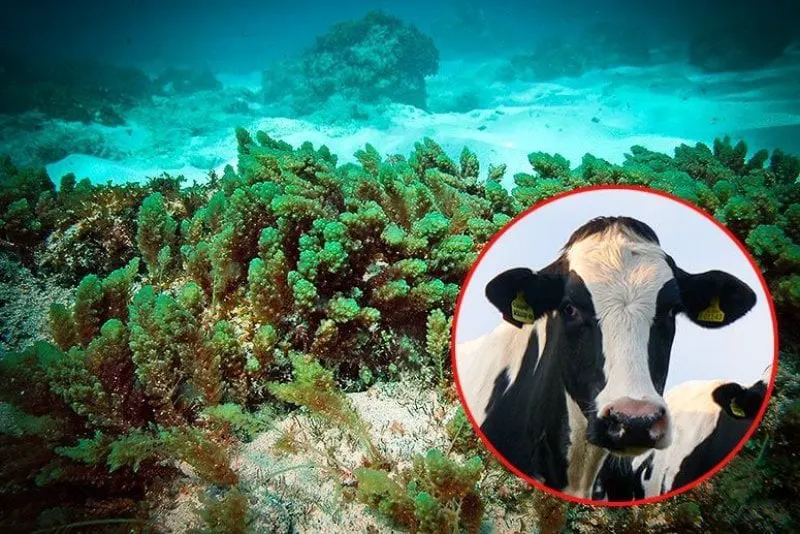Seaweed could ‘neutralize’ stubborn methane emissions from cows, slowing climate change
Seaweed could ‘neutralize’ stubborn methane emissions from cows, slowing climate change


Reducing methane from livestock, and cows in particular, has long been a goal of scientists and policymakers but is especially tricky: How do you change a fundamental fact of animal biology in an ethical way that doesn’t affect milk or meat?
In lab tests and field trials, adding a small proportion of [seaweeds Asparagopsis taxiformis and Asparagopsis armata] to a cow’s daily feed — about 0.2 of a percent of the total feed intake in a recent study — can reduce the amount of methane by 98 percent. That’s a stunning drop when most existing solutions cut methane by about 20 or 30 percent.
Meanwhile, growing seaweed used for the feed supplement could also help sequester carbon dioxide, another greenhouse gas, and reduce ocean acidification, because the plant sucks up carbon in the water as food.
Rob Kinley, the scientist who identified asparagopsis as a methane inhibitor, said it might just be the most promising way to eliminate methane emissions from livestock in the next decade.
That’s significant because livestock overall account for about 15 percent of global greenhouse gas emissions, with nearly 40 percent of that linked to methane from the digestive process according to the United Nations’ Food and Agriculture Organization. The amount of methane from livestock production alone is about the equivalent of the emissions from about 650 million cars.
Read the original post

 | Videos | More... |

Video: Nuclear energy will destroy us? Global warming is an existential threat? Chemicals are massacring bees? Donate to the Green Industrial Complex!
 | Bees & Pollinators | More... |

GLP podcast: Science journalism is a mess. Here’s how to fix it

Mosquito massacre: Can we safely tackle malaria with a CRISPR gene drive?

Are we facing an ‘Insect Apocalypse’ caused by ‘intensive, industrial’ farming and agricultural chemicals? The media say yes; Science says ‘no’
 | Infographics | More... |

Infographic: Global regulatory and health research agencies on whether glyphosate causes cancer
 | GMO FAQs | More... |

Why is there controversy over GMO foods but not GMO drugs?

How are GMOs labeled around the world?

How does genetic engineering differ from conventional breeding?
 | GLP Profiles | More... |

Alex Jones: Right-wing conspiracy theorist stokes fear of GMOs, pesticides to sell ‘health supplements’




 Trust issues: What happens when therapists use ChatGPT?
Trust issues: What happens when therapists use ChatGPT? California, Washington, Oregon forge immunization alliance to safeguard vaccine access against federal undermining
California, Washington, Oregon forge immunization alliance to safeguard vaccine access against federal undermining Fighting deforestation with CO2: Biotechnology breakthrough creates sustainable palm oil alternative for cosmetics
Fighting deforestation with CO2: Biotechnology breakthrough creates sustainable palm oil alternative for cosmetics Viewpoint — Fact checking MAHA mythmakers: How wellness influencers and RFK, Jr. undermine American science and health
Viewpoint — Fact checking MAHA mythmakers: How wellness influencers and RFK, Jr. undermine American science and health 30-year-old tomato line shows genetic resistance to devastating virus
30-year-old tomato line shows genetic resistance to devastating virus The free-range chicken dilemma: Better for birds, but with substantial costs
The free-range chicken dilemma: Better for birds, but with substantial costs Viewpoint: Video — Big Solar is gobbling up productive agricultural land and hurting farmers yet providing little energy or sustainabilty gains
Viewpoint: Video — Big Solar is gobbling up productive agricultural land and hurting farmers yet providing little energy or sustainabilty gains ‘You have to treat the brain first’:Rethinking chronic pain with Sanjay Gupta
‘You have to treat the brain first’:Rethinking chronic pain with Sanjay Gupta
